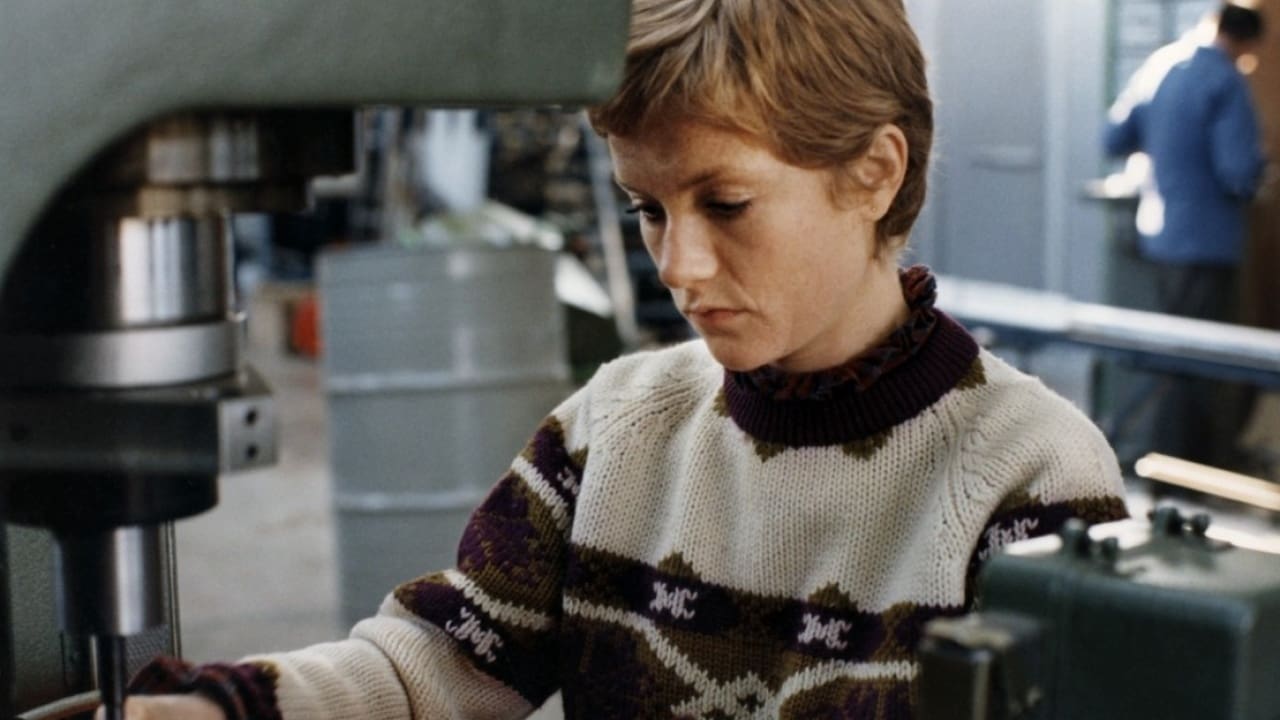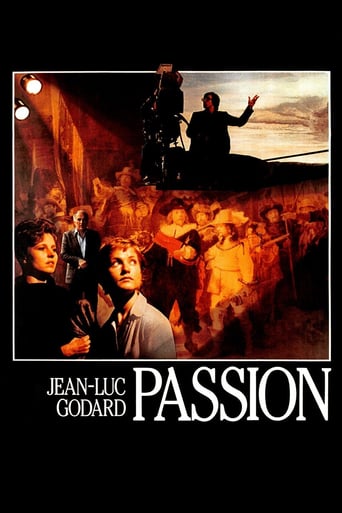

Passion was the kind of Jean-Luc Godard picture I would watch rather late at night, ironically enough, thinking of it and other works of his like digging into a good book as something fulfilling before conking out. There are things that make this effort quite reccomendable, albeit I'm not sure how I would react to it overall if seen again in the context of a sunny day and some more concentration going on. What remains striking, even when Godard was at his most slumming-it points in the 80s (and he had quite a few) are the images as done by a master of the camera. The opening shot is one of these, with the airplane far off in the sky letting out its white line of smoke, photographed to a classical composition playing in the background. It has a feel of the documentary, but the push of something more operatic in the meaning behind the image. This could go for what is most significant about the rest of the film, where- per usual as one of Godard's most love-hate subjects- cinema itself is dissected though what could be more like abstract documentary figures as characters.The one asset to a film like Passion, at least in comparison to other works at this period for the filmmaker, is that there is at least something of a story going on, something that doesn't shut out a viewer entirely by the banality of overused semantics and images that end up evoking a disinterest in the distance of subject to viewer. There's even a couple of conversations one sees from time to time with the characters that go towards at least coherent and at best with a good edge at the struggles of film-making and the hassles of love, or half-hearted lust. The only problem then comes with some of this just being so experimental that it ends up closing off some viewers. I remember one segment that had the inklings of being a compelling scene, where Godard shows the filming within the filming (if it is that, maybe it isn't) of a period piece being filmed. There's many faces and narration going over each face and image, but one's attention (at least mine anyway) waxed and waned. This may or may not be Godard's fault; in fact, one of the points that Godard has in his main filmmaker character having to make a film on TV is how mixed forms of media can be sort of antithetical. But to say that there are more than a couple of scenes and moments that foreshadow Godard's decent into pure (un-captivating) self-indulgence in his later years is present, even amid the nudity and classical music.
... View MoreJean-Luc Godard's "Passion" can only be described as an absolute bore. The director presents his audience with a film that hardly has a storyline; there is no intrigue and no entertainment. Lets say that his pursuit for originality is the reason why it's all so strange and dull. The disjointed scenes means that the viewer quickly looses interest- this lack of continuity persists throughout the entire film. The classical music in the background sounds like a technical fault, as it inhibits the clarity of the dialogue- all I could hear was mumbled monotone voices. There is much confusion and it takes a lot of effort to identify characters and establish relationships between them.Being a film student myself, as much as I would like say that Godard moves away from typical Hollywood cinema and presents us with an artistic piece, the film is an absolute flop. The story does not develop, the nudity scenes are pointless, and the characters are uninteresting. When the film finally ended , I came out feeling unfulfilled.
... View MoreIf one were to hold up a camera to life and to film for ninety minutes, the result would be, more than likely, a boring snapshot of the banal and mundane. These snapshots of life would have no narrative, would be disjointed and chaotic, for such is life. Godard's Passion struck me as just that, a snapshot of the banality of life, the disconnected, seemingly meaningless misadventures of ordinary people, captured in one moment of time. But of course, these are not ordinary people in ordinary circumstances, these are the creations of Godard's imagination, yet the presentation of the content of the film is without structure, narrative or any of the Hollywood conventions of 'good filmmaking'. I found the film compelling and intriguing; I wanted to know more about the people and the universe that they populated. The lack of narrative structure was not a negative factor in my enjoyment of the film, for the anarchic content was, of itself, enough to keep my mind from wandering away from it. Godard's reflexive jibes at cinema convention were acerbic and witty, carrying with them a tremendous knowledge of the mechanics of filmmaking. The story of Passion, what story there is, is subservient to the process of filmmaking and Godard's desire to subvert it. For me, that is what makes this film so entertaining.The influence of Godard's work on other filmmakers is probably most profound in European cinema where the role of the Auteur is, if not quite nurtured, respected. It was a delightful surprise for me when, having seen Passion, I began to draw connections between Godard's storytelling and popular TV comedy. The First Series of the BBC comedy 'The Office', by Ricky Gervais and Stephen Merchant, leapt to mind as I mulled over Passion. The non-structure of Passion is very much evident in The Office, where the stories unfold as snapshots and moments in time, captured, and heavily influenced by the presence of the cameras. The Office is probably the most original piece of TV comedy since Monty Python's Flying Circus, yet I can see the influence of filmmakers like Godard in its presentation. Although there exists an A plot, B plot and guest plots, typical TV structure, in The Office, it is the presentation that makes all the difference. If handled in a more traditional fashion, it is highly unlikely that The Office would ever have been made, never mind popular. Even the origins of The Office pay homage to the anti-structural approach of filmmakers like Godard. Conceived and performed as an adlib piece on a BBC director's course by Gervais and Merchant, it shined with originality and a deep knowledge of and healthy disrespect for, convention; much like Godard really.The success of The Office owes much to its originality and wit but also to the possibility that the audience is searching for a new experience in terms of storytelling both on television and film. The irony is that this type of storytelling has been with us since Godard and long before Godard. Perhaps the audience has finally caught up with the filmmakers.
... View MoreCinema, just like other forms of art is an expression of feelings. That's what Art is all about! If I make a movie, first of all I am making it for myself. That's how I have felt. I wont force anyone to like my job. Some viewers establish communication, some dont. No Rebuke!
... View More